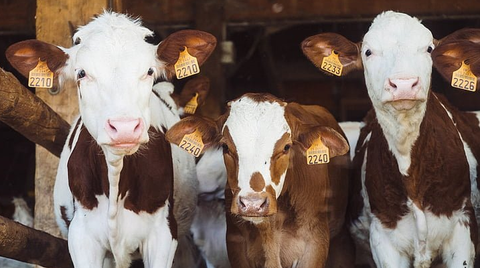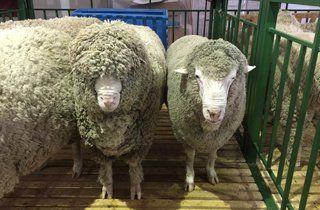Eco-Bedding for poultry and cattle
- Less ammonium and hydrogen sulphide released
- Neutralises bedding, making it more hygienic

Application frequency depends on the weight and number of animals per m^2. To treat and prevent mastitis, we recommend treating bedding every 7-10 days. The stalls should have a slightly sloped floor preferably covered with grates or drainage material for better removal of excessive liquid. The temperature in the premises should be at least +1°C.
Buy it now
The deep bedding for cattle is formed in two stages. The floor should be covered with 30-40 cm of straw (if animals weigh 500-1000 kg, increase the straw layer up to 50-60 cm), sawdust or hulls. Spread the required amount of the product over the straw and then let the animals onto the bedding. The urine and manure will start activating the bacterial components of the product. In 1-2 days, add another 30 cm of straw and treat it with the product again.
It is recommended that the litter should be turned every 3 months if the animals are not inclined to dig the bedding material.
For convenience, use a sieve to spread the product or mix it with an inert filler (oil seed coarse meal, sand, scalpings, sawdust, chalk, etc.).
As the litter becomes dense, more straw or sawdust should be added.
Maximum bedding lifetime: 2 years. The bedding can be placed into a heap for a month, and then it can be applied directly to the fiel (kindly confirm with your local regulations).
Dosage
| Animals |
Bedding floor area to be treated with 1 kg of
the product (m 2
) |
Application frequency (once in … weeks) |
| Cattle |
600 |
2-4 |
| Pigs |
600 |
2-4 |
| Sheep, goats, dogs |
500 |
3-4 |
| Raccoons, rabbits |
800-1000 |
3-4 |
| Chickens, ducks, turkeys |
500 |
3-5 |
| Ostriches |
260 |
3-5 |
When necessary or in adverse conditions, the dosage can be increased.
DO NOT apply this product simultaneously with chlorine compounds or antibiotics (chloropicrin and the like).
Storage: Store in a cool dry place. Avoid exposure to direct sunlight. PROTECT FROM FREEZING!
Safety: BE Litter Bedding Solution is harmless to humans, animals, and the environment and contains no aggressive chemicals. The product contains group 4 microorganisms (non-hazardous). The product has no genetically modified or pathogenic microorganisms and complies with the WHO, FAO, and JECFA requirements.
DO NOT apply this product simultaneously with chlorine compounds or antibiotics (chloropicrin and the like).
Storage: Store in a cool dry place. Avoid exposure to direct sunlight. PROTECT FROM FREEZING!
Safety: BE Litter Bedding Solution is harmless to humans, animals, and the environment and contains no aggressive chemicals. The product contains group 4 microorganisms (non-hazardous). The product has no genetically modified or pathogenic microorganisms and complies with the WHO, FAO, and JECFA requirements.
How it works
BE Eco-Bedding is a bacterial product intended for keeping livestock animals on deep litter that is replaced at intervals of up to 2 years. Bedding can be made of straw, sawdust, hulls and granules (when using granules, add some straw to the bedding). The optimum ratio of sawdust to straw is 1:1. Selected beneficial bacteria start and maintain aerobic composting of manure/poultry litter with bedding material.
Improvement of livestock breeding conditions reduce feed consumption, especially during the cold season, and accelerate the growth of young animals, while reducing their mortality rate. The additional heat released in the deep bedding (40 cm or more in depth) contributes to a reduction of energy usage to heat the indoor space. Additionally, less labour is required to remove manure.
Improvement of livestock breeding conditions reduce feed consumption, especially during the cold season, and accelerate the growth of young animals, while reducing their mortality rate. The additional heat released in the deep bedding (40 cm or more in depth) contributes to a reduction of energy usage to heat the indoor space. Additionally, less labour is required to remove manure.
The main causes of mastitis are infections, poor temperature conditions and farm hygiene, malnutrition, lack of activity, udder injuries. The bacteria contained in the product form a complex association and inhibit the growth of pathogenic microorganisms and effectively compete with them for living space and nutrients. The deep litter warms up, which additionally sterilizes the bedding. The application of this product, together with sufficient pasturing to improve the blood circulation, lowers the risk of hoof and udder diseases. As a result, the amount of antibiotics used to raise livestock can be reduced. The respiratory system condition in poultry also gets better due to the decreasing ammonia content.
Science behind it
The process starts with decomposition of undigested starch, fiber, pentosans, pectic substances, protein compounds and urea. Bacteria convert proteins and urea into amino acids and then into ammonia, hydrogen sulfide and carbon dioxide. The hydrolysis of organic matter in manure is attended by formation of formic, acetic, propionic, butyric and lactic acids. This inhibits the development of pathogenic microorganisms and vermin.
Then, the manure/poultry litter goes through the stage of deep composting with a significant loss of dry weight. The organic matter decomposition causes the emission of carbon dioxide, methane, hydrogen and molecular nitrogen. If there is molecular oxygen in the upper layer of the bedding, the bacteria fix volatile ammonia gas and oxidise it into nitrous and nitric acids. Then these acids are converted into molecular nitrogen by means of denitrifying bacteria. Nitrogenous compounds improve the characteristics of the compost as a fertilizer, while the gas emission – alongside unpleasant odours – is reduced.
During the composting process, the manure/poultry litter is converted to humus. The lower layers form a substrate consisting of fiber, phosphates, nitrates, micronutrients, and biomass of microorganisms. This substrate is rich in humic substances, amino acids, enzymes and nutrients. The lower compost layers are completely neutralised and can be used as a high quality fertilizer immediately after they are removed from the stalls.



